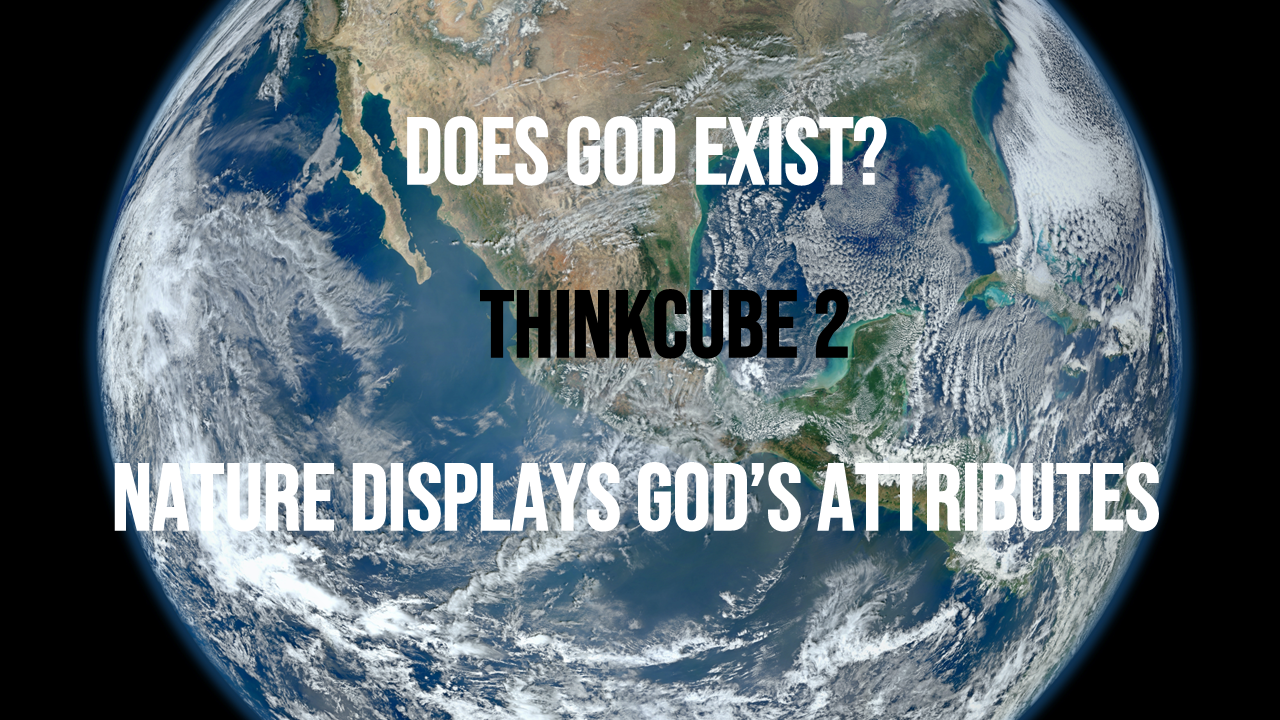
For ever since the world was created, people have seen the earth and sky. Through everything God made, they can clearly see his invisible qualities—his eternal power and divine nature. So they have no excuse for not knowing God.
Romans 1:20
The apostle Paul writing in Romans Chapter 1 says that creation communicates and reflects God’s Divine Nature. Creation provides “general revelation” meaning it reveals truths about God because He created it, and his character is evident in what he made.
| Attributes of God’s Divinity displayed in nature | Examples |
| Majesty | Sky, Stars, Mountains, Valleys, Forests, Fields, Flowers, Oceans, Rivers, Canyons, Waterfalls |
| Wisdom | DNA, Laws of Physics, Fine-Tuning of Universe, Human Brain, Atomic Energy |
| Character | Order, Precision, Organization and Purpose |
| Benevolence | Rain, Sun, Food, Breathable Air, Natural medicines |
| Infinitude | Vastness of the Universe, Knowledge and Continued Discovery |
Premise 1: Creation reflects God’s majesty and wisdom
Majesty
It is said that an artist creates from the beauty within. Similarly the beauty of the natural world reveals the beauty of the God who created it.
The workman is known by his work. The variety, multitude, order, beauty, harmony, different nature, and excellent contrivance, of the things that are made, the direction of them to certain ends, and the concurrence of all the parts to the good and beauty of the whole, do abundantly prove a Creator and his eternal power and Godhead
Matthew Henry
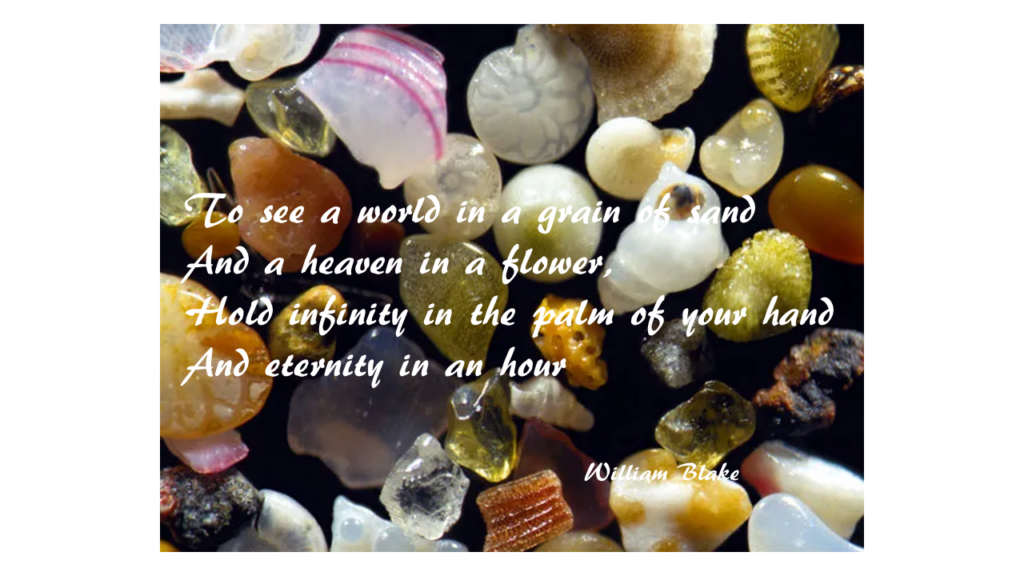
Psalm 19:1 says The heavens are declaring the glory or majesty of God—that the beauty and majesty of the over one hundred billion galaxies and their billions of stars are silently testifying to God’s glory and that their expanse is proclaiming that it’s His handiwork and nothing else.
Wisdom
Google estimated that there are roughly 130 million unique books in the world a significant portion of these are written about the 10 major branches of science which are: Physics, Chemistry, Astronomy, Geology, Oceanography, Meteorology, Biology, Zoology, Botany, and Ecology.
All of the millions upon millions of books, papers, articles about the physical sciences contain what is called “Derived Knowledge”. Derived Knowledge is knowledge that was obtained or inferred from pre-existing knowledge or data. None of the principles, essentials, or components of nature were invented by man so the intelligence contained in them was pre-existing and can only be discovered, studied, and commented on.
Wisdom enables us to understand reality. Through wisdom we have discovered a set of scientific laws that elegantly express reality in the language of mathematics. Whenever man learns the logic of the universe, man is (in essence) “thinking God’s thoughts after Him.” A correct “understanding, therefore, is that we humans discover and (implement) wisdom; we do not invent it.
Institute For Creation Research; Nature Reveals God’s Wisdom
The philosophy of Pythagoras, Plato, and the Stoics shows that even the ancients discovered a great deal of the knowledge of God through the observance of nature. The Bible declares that natures design, majesty, diversity and natural laws is enough to make even a small child philosophical about how such marvels were made and who was the mind that made them.
Sir Isaac Newton said that: “In the absence of any other proof, the thumb alone would convince me of God’s existence.” Charles Darwin said the complexity of the human eye “makes me shudder”. The complexity of the cell, the Laws of Physics which govern the Universe with absolute precision, and the 8.7 million anatomical DNA blueprints of animals and insects perfectly designed for form and function cannot be the result of natural random processes.
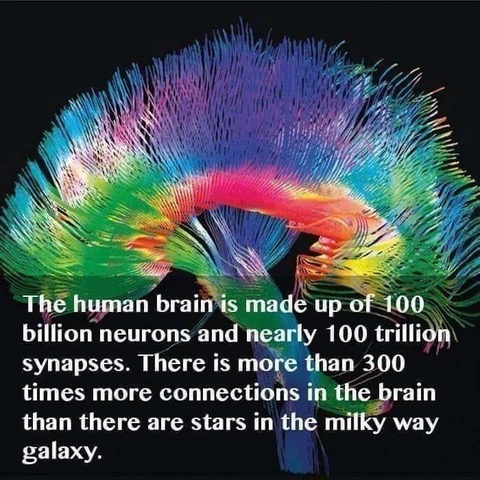
The cause of our universe coming into being and continuing to operate as it does is a dynamic display of cosmic wisdom. The unfathomable amount of applied knowledge (wisdom) that was used to invent the universe, and to pre-program its interactive workings, is a source of beyond-the-imagination-wonder!
Institute For Creation Research; Nature Reveals God’s Wisdom
Challenge Question: Do you think the beauty, diversity, and knowledge found in nature is the result of a supremely creative intelligence or random and purposeless natural processes?
Premise 2: Creation reflects God’s Character
char·ac·ter
/ˈker(ə)ktər/
the mental and moral qualities distinctive to an individual.
“running away was not in keeping with her character”
Creation displays God’s power and infinite intelligence but it also demonstrates keen clues as to what his primary moral distinctives are. The Bible describes God as being infinite therefore there is no limit to God’s perfections. When we consider God’s attributes, we must always consider them as infinite. So if we say God is just, loving and merciful then He would be infinitely and perfectly just, loving and merciful. Here are some of the infinite character attributes that demonstrate God’s moral perfections.
- Nature reveals God as an ordered lawgiver
- Nature reveals God’s as unchanging
- Nature reveals God as benevolent
Nature reveals God as a ordered lawgiver
Nature reveals God’s orderliness and character through its intricate design, predictable cycles, and the beauty and harmony that permeate all of creation, suggesting a divine creator and sustainer. The precise organization and functionality of the smallest cell to the human body which maintains a constant 98.6 degrees. Notice the precision in that it is always 98.6 and not 98 or 98.7.
Everything in the universe, every plant and animal, every rock, every particle of matter or light wave, is bound by laws which it has no choice but to obey. The Bible tells us that there are laws of nature—”ordinances of heaven and earth”. These laws describe the way God normally accomplishes His will in the universe.
Answers In Genesis; God and Natural Law
The universe exhibits a remarkable degree of order and regularity, with phenomena like gravity, planetary motion, and the laws of physics operating consistently. This orderliness suggests a design and a source of authority, pointing towards a lawgiver.
Here are the fundamental Laws of Physics which govern the Universe with absolute precision
- Newton’s Laws of Motion: These three laws describe how objects move and interact.
- Law of Universal Gravitation: This law describes the force of attraction between any two objects with mass.
- Maxwell’s Equations: These equations describe the behavior of electromagnetic fields.
- Einstein’s Theory of Relativity: This theory describes gravity and the relationship between space, time, and the universe.
- Quantum Mechanics: This theory describes the behavior of matter and energy at the atomic and subatomic level.
- Laws of Thermodynamics: These laws describe the behavior of heat and energy transfer.
- Laws of Conservation: These laws state that certain quantities, like energy and momentum, remain constant in a closed system.
- Other Important Laws: Coulomb’s law, Gauss’s law, Archimedes’ principle, and Kepler’s Laws are also important.
There are also 26 fundamental constants that are physical quantities that are universal and unchanging such as the speed of light, or the strength of gravity.
The Universe and nature would never been able to exist if these constants and laws were not already precisely in place the second the Universe was created.
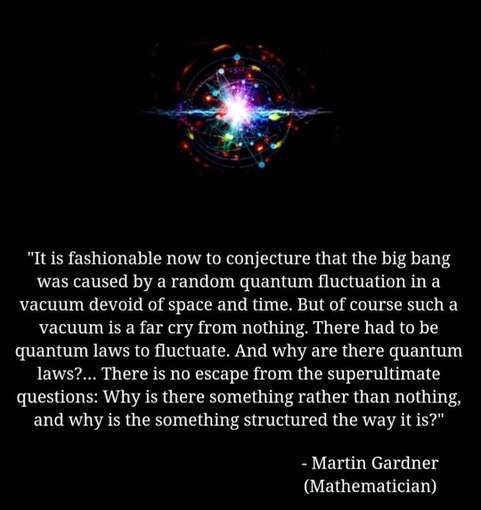
It’s scientifically impossible to explain how 26 constants have remained precisely fixed at their operating values for billions of years. Further, its impossible to scientifically explain how every type of subatomic particle is designed to work as per the parameters of these 26 constants. Every type of sub-atomic particl has obeyed these 26 constants since the moment the universe was created.
Jeff Miller; PhD Molecular Mechanisms; UCLA Molecular Genetics Department
The Universe is supposedly unplanned, not designed by intelligence. Why then would we expect it to be organized? Why expect the Universe to obey laws when there is no Law-Giver? Why expect to find rational patterns in nature, if nature is an irrational accident?
Jason Lisle; Evolution vs Science
The Bible describes these laws and constants the “ordinances of heaven and earth” and they demonstrate God’s flawless competence that He is an ordered lawgiver.
Challenge Question: Do you think the 26 Constants and the Laws of Physics that have had to be in operation since day one of the Universe’s existence arose randomly—or from God? If from God what do you think it says about Him?
Premise 3: Creation reflects the Unchangeableness of God
im·mu·ta·ble
/i(m)ˈmyo͞odəb(ə)l,əˈmyo͞odəb(ə)l/
unchanging over time or unable to be changed
“an immutable fact”
Nature’s inherent constancy and the cyclical nature of natural processes, like seasons, tides, and celestial orbits reflect God’s immutability and unchanging nature. These steadfast and predictable patterns reflect the constants of God’s character and and that His faithfulness and promises are reliable and enduring.
He who is the Glory of Israel does not lie or change His mind; for He is not a human being that He should change His mind
1 Samuel 15:29
Every year the Earth orbits the Sun at an average distance of 92.96 million miles or 8.317 light minutes and a complete orbit takes 365.256 days. Because the orbits of planets, stars, sun and moon are so precisely predictable scientist are able to know when eclipses occurred thousands of years ago, and the exact dates they will occur thousand of years into the future. Here is an example that actually aligns with a famous account in the Bible in Joshua 10:13.
So the sun stood still,
The Israel Times
and the moon stopped,
till the nation avenged itself on its enemies…
The sun stopped in the middle of the sky and delayed going down about a full day
Cambridge researchers announced Monday that they have pinpointed the date of the biblical account of Joshua stopping the sun—which they claim is the day of the oldest eclipse ever recorded to October 30, 1207 BCE, exactly 3,224 years ago
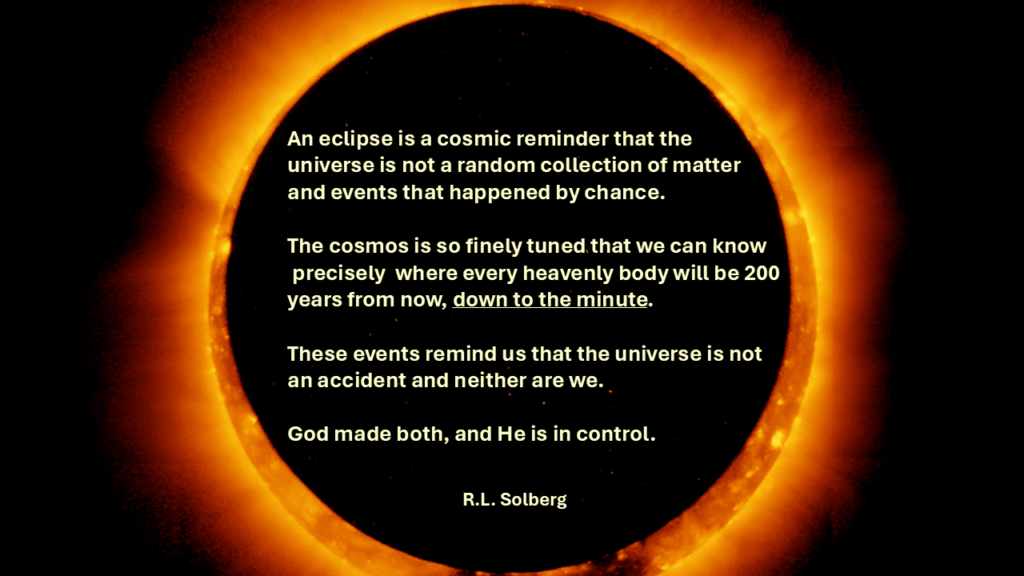
The predictable orbit of celestial bodies is just one of a number of natural phenomena and predictable tendencies which are essential to every conceivable natural and physical system in the Universe.
| Things In Nature That Reflect God’s Immutability | Description |
| Laws of Physics and 26 Constants | These laws and constants have been precisely fixed since the first second the Universe was created. |
| Solar Days | The predictable 24 hour time period it takes for the Earth to rotate once on its axis. The Earth’s 365 day, 5-hour, 48 minute and 45.51 second-round-trip is accurate to a thousandth of a second. |
| Seasons | Winter, Spring, Summer and Fall same frequency and duration annually due to earth’s rotation and orbit around sun being consistent |
| Tides | Can be predicted to within the hour globally due to the predictable gravitational forces of the moon and the earths rotation. |
| Hydrological Cycle | The water cycle involves the continuous circulation of water in the Earth-atmosphere system, moving from the ground to the atmosphere and back again. Evaporation-condensation-and precipitation |
| Homeostasis | All living organisms are homeostatic. Homeostasis is the ability to maintain a stable internal environment despite external changes, which is crucial for survival and function. |
The Bible says that God is the “Consistency” behind nature’s “Constancy”
Colossians 1:16-17
For by him all things were created, that are in heaven, and that are in earth; visible and invisible, whether they be thrones, or dominions, or principalities, or or powers, all things were created by Him and for Him.
And He is before all things, and by Him all things consist
The word consist is the word we get “consistency” from which means unchanging in nature, standard, or effect over time. However long secular or Christian scientist believe the Universe and particularly the earth have existed may be disputed—however, what cannot be disputed is that if any of the Laws of Physics or constants or any other number of mathematical consistencies were altered or “changed” even by an infinitesimal amount chaos would result.
- Even a small change in the rate of Earth’s rotation around the sun or on its axis would be catastrophic.
- If the moon were much nearer to the Earth, huge tides would inundate the continents.
- Even a slight change in the composition of the gases that make up our atmosphere would be fatal to life.
- A slight change in the mass of the proton would result in the dissolution of hydrogen atoms resulting in the destruction of the universe
- If the earth was not tilted precisely 23 degrees on its axis we would not have its four seasons to sustain life
Because of these constants, laws, and unchanging parameters totally exclusive to earth life is not only possible but it is sustained. The consistent, persistent, and precise sustainment of life on earth is a constant echo of God’s consistent and persistent regard for the humans inhabiting the only planet among thousands that can sustain life. The unchangeableness of God in nature reveals:
| Faithfulness and Reliability | God’s unchangeable nature means His character, plan and purposes remain constant, offering a sense of security and reliability in a world of uncertainty. |
| Perfection and Stability | God’s immutability is seen as a reflection of His perfect nature, meaning He cannot be subject to change, as change would imply imperfection. |
| Eternal and Unwavering | God’s unchangeableness is tied to His eternal nature, meaning He exists outside of time and therefore is not subject to the limitations and changes that humans experience |
| Consistency in Love and Justice | God’s unchangeable love, justice, and mercy are constant, meaning that His character and ways remain the same, regardless of circumstances or human actions. |
| Security in Times of Need | Knowing that God does not change provides comfort and assurance during times of hardship, as believers can rely on His unchanging nature for strength and guidance. |
The unchangeableness of God, or immutability, provides a foundation of stability and reliability in a world of constant flux, assuring believers of God’s consistent character, promises, and purposes.
Challenge Question: Do you think it is possible that the control, concern, and consistency God demonstrates every second in sustaining the Universe shows that He can be totally relied upon?
Premise 4: Creation Reflects God’s Benevolence
be·nev·o·lence
/bəˈnevəl(ə)ns/
the quality of being well meaning; kindness
Creation reflects God’s benevolence through the beauty, order, and provision found within it, showcasing a loving and caring God who created everything with purpose and care. The Bible states that God saw everything he had made, and it was “very good” (Genesis 1:31), indicating that creation is a reflection of God’s goodness and benevolence.
Here are some of the ways it does:
| Beauty and Order | The intricate design and beauty of the natural world, from the vast cosmos to the smallest flower, point towards a creator who is not only powerful but also creative and benevolent. |
| Provision and Sustenance | The intricate design and beauty of the natural world, from the vast cosmos to the smallest flower, point towards a creator who is not only powerful but also creative and benevolent. |
| Stewardship and Care | God has given humanity the role of caretaker of the earth, emphasizing the importance of caring for and preserving creation, a responsibility that reflects God’s benevolent nature. |
Creation is a gift from God
Creation is a manifestation of God’s love an goodness, providing a place for humanity to live, learn, and grow, and offering opportunities for experiencing profound beauty and wonder.
Then God said, “Let us make man in our image, after our likeness. And let them have dominion over the fish of the sea and over the birds of the heavens and over the livestock and over all the earth and over every creeping thing that creeps on the earth.”
Genesis 1:26-31
So God created man in his own image,
in the image of God he created him;
male and female he created them.
And God blessed them. And God said to them, “Be fruitful and multiply and fill the earth and subdue it, and have dominion over the fish of the sea and over the birds of the heavens and over every living thing that moves on the earth.” And God said, “Behold, I have given you every plant yielding seed that is on the face of all the earth, and every tree with seed in its fruit. You shall have them for food. And to every beast of the earth and to every bird of the heavens and to everything that creeps on the earth, everything that has the breath of life, I have given every green plant for food.” And it was so. God saw everything that he had made, and behold, it was very good. And there was evening and there was morning, the sixth day.
| Manifestations of God’s Love and Goodness In Nature | The very act of creation, bringing something into existence from nothing, is seen as an expression of God’s power and love |
| Provision for Humanity | Creation provides the physical world, including the natural environment, with the resources and beauty that humans need and can appreciate |
| Opportunity for Growth and Learning | The world offers opportunities for humans to learn, grow, and develop their potential through interaction with nature and other people |
| Stewardship and Responsibility | In some religious traditions, humans are seen as stewards of creation, entrusted with caring for the world and its resources |
| A Reflection of God’s Glory | Creation helps us to reflect on God’s character and nature, showcasing his power, wisdom, and creativity |
| A Call to Gratitude | Recognizing creation as a gift from God can inspire a sense of gratitude and reverence for the world around |
God’s benevolence is demonstrated in the way He has provided for His creatures needs
Yet He has not left Himself without testimony: He has shown kindness by giving you rain from heaven and crops in their seasons; he provides you with plenty of food and fills your hearts with joy
Acts 14:17
Webster’s Dictionary defines benevolence as the quality of being well meaning or kindness. Acts 14:17 describes how nature reflects God’s benevolence for all mankind which Christians call common grace. Common grace is the goodness and favor of god extended to all of creation, regardless of their faith or righteousness. God shows in providing food, rain, sunshine, natural medicines, and the deriving of pleasure which comes from experiencing beauty in nature are vivid examples of common grace. Here are just a few of the more obvious ways God shows care to His creation:
Food and Water
The science journal Elementa presented an analysis of global and regional food supply to reveal the flows of calories, protein and the micro-nutrients vitamin A, iron and zinc from production to human consumption. It concluded that the current production of crops is sufficient to provide enough food for the projected global population of 9.7 billion in 2050. All of this food comes from the hundreds of plant species that genetically designed to be edible and nutritious. Coupled with the 1.3 billion tons of food that is wasted each year according to (FAO)
In order for this enormous food supply to grow High Tide Technologies estimated that it takes over 2 quadrillion gallons of water. That is enough to cove the entire United States in 2 feet of water.
Humans on average should drink about 5600 gallons of water per year—multiply that with 9.7 billion and that is what nature provides here on earth and nowhere else.
Sunshine
Another reason you cannot find any plants or protein to sustain life on any other planet but earth is because of the extreme cold or extreme hot temperatures. Also, many planets have long seasons of darkness or constant light. For instance the time between sunrises on Mercury is Mercury which takes roughly 176 Earth days. A “day” on Venus (the time it takes for the planet to rotate once relative to the sun) is 243 Earth days.
On average, every location on Earth experiences roughly 12 hours of daylight and 12 hours of darkness per day, though this varies based on latitude and time of year. This is not only essential to a bountiful food supply due to photosynthesis, but to the long term health of humans and animals.
The best-known benefit of sunlight is its ability to boost the body’s vitamin D supply; most cases of vitamin D deficiency are due to lack of outdoor sun exposure. At least 1,000 different genes governing virtually every tissue in the body are now thought to be regulated by vitamin D which no other planet would be able to provide in sufficient amounts for human health.
Natural Medicines
Ancient Sumerian clay tablets dated ca. 3,000 B.C list hundreds of medicinal plants. Ancient Egyptian, Chinese, Indians, Aboriginals, and Aztecs all widely used plants to treat wounds, ailments, fevers, and disease, and relieve pain for thousands of years. Over 50,000 plant species are used for medicinal purposes worldwide. Plants and fungi have provided key pharmaceuticals to treat cardiovascular disease, cancer, and diabetes to name a few.
From the rising of the sun to the falling of the rain, common grace is seen in the everyday blessings of life. It encompasses God’s gracious provision for His creatures and reveals that His nature encompasses concern, generosity, and kindness.
The James Webb Telescope is 100 times more powerful than it’s famous predecessor the Hubble Telescope. The JWST has observed the atmospheres of hundreds of exoplanets, and can also observe planets in our solar system, including Mars, Jupiter, Saturn, Uranus, Neptune, and Pluto, as well as their moons. It has not found life, usable water, or breathable air on any of those hundreds of planets.
The Earth is exclusively habitable and has beautiful, exquisite life forms in every niche of the globe. Food sources and water are plentiful. None of these things exist anywhere else but here and all reflect the specific care and regard God has for mankind.
Challenge Question: Do you think the beauty, and abundance found on earth is just the result of this planets blind luck—or do you think it is the evidence of God’s regard for mankind?
Premise 5: Creation reflects the Infinitude of God
in·fin·i·tude
/inˈfinəˌto͞od/
the state or quality of being infinite or having no limit
Creation reflects God’s infinity through its sheer scale, complexity, and the boundless beauty and wonder it reveals, suggesting a creator of limitless power and imagination. Creation reveals the existence of a God who presides in majestic, transcendent, sustaining power. Here are 3 examples:
| Scale and Vastness | The universe, with its billions of galaxies and stars, is a testament to God’s infinite power and scope. The sheer size of the cosmos, and the vastness of space and time, points to a creator who is not bound by limitations. |
| Complexity and Order | The intricate and ordered nature of the universe, from the smallest subatomic particles to the largest galaxies, suggests a brilliant and infinite intelligence at work. The laws of physics and the delicate balance of nature point to a creator who is not only powerful but also wise and creative |
| Transcendent Nature | The beauty and wonder of creation, from the majesty of mountains to the delicate beauty of a flower, speaks to a creator who is not only powerful but also loving and artistic. The sheer diversity of life and the intricate designs within nature point to a creator who is not limited by our understanding of beauty. |
For since the creation of the world God’s invisible qualities—his eternal power and divine nature—have been clearly seen, being understood from what has been made, so that people are without excuse.
Romans 1:20
The infinite nature of God simply means that God exists outside of and is not limited by time or space. Infinite simply means “without limits.” Romans 1:20 says the limitless knowledge, creative power, and eternality of God is clearly reflected in creation and that the limitless amount of discovery and mystery indicate that He is infinite in more than one way.
When Christians refer to God as “infinite,” they often are referring to His omnipotence, and omnipresence
Omnipotence— The word omnipotent comes from omni- meaning “all” and potent meaning “power.” As with the attributes of omniscience and omnipresence, it follows that, if God is infinite, and if He is sovereign, which we know He is, then He must also be omnipotent. He has all power over all things at all times and in all ways.
The concept of God creating the universe “out of nothing” (ex nihilo) is a powerful testament to His omnipotence. This implies a power beyond any natural limitation, capable of bringing existence into being where there was none before.
God not only created the universe but also sustains and governs it, demonstrating ongoing power and control. This includes the laws of nature, the cycles of the seasons, and the delicate balance of ecosystems.
Omniscience—Omniscience is defined as “the state of having total knowledge, the quality of knowing everything.” For God to be sovereign over His creation of all things, whether visible or invisible, He has to be all-knowing. Creation reflects God’s omniscience, or all-knowingness, through its intricate order, purpose, and the inherent goodness of all things.
The universe, with its complex systems and laws, points to a creator who understands and orchestrates everything with precision. As Creator, God knows every intimate detail about His creation, demonstrating His all-encompassing knowledge.
So how much information is there in the world? How much has it grown? Prepare for some big numbers:
- Looking at both digital memory and analog devices, the researchers calculate that humankind is able to store at least 295 exabytes of information. (Yes, that’s a number with 20 zeroes in it.)Put another way, if a single star is a bit of information, that’s a galaxy of information for every person in the world. That’s 315 times the number of grains of sand in the world. But it’s still less than one percent of the information that is stored in all the DNA molecules of a human being.
- In 2007, humankind successfully sent 1.9 zettabytes of information through broadcast technology such as televisions and GPS. That’s equivalent to every person in the world reading 174 newspapers every day.
- On two-way communications technology, such as cell phones, humankind shared 65 exabytes of information through telecommunications in 2007, the equivalent of every person in the world communicating the contents of six newspapers every day.
- In 2007, all the general-purpose computers in the world computed 6.4 x 10^18 instructions per second, in the same general order of magnitude as the number of nerve impulses executed by a single human brain. Doing these instructions by hand would take 2,200 times the period since the Big Bang.
These numbers are impressive, but still miniscule compared to the order of magnitude at which nature handles information. Compared to nature, we are but humble apprentices.
Martin Hilbert; How Much Information Is There In The World, Science Express
Blaise Pascal was a French philosopher, mathematician, scientist, inventor who not only had an IQ between 180-195. Using his mathematical mind he said that the amount of knowledge the smartest man on earth is equivalent to the amount of space he physically occupies compared to the amount of space in the Universe.
| Ways The Universe reflects God’s Infinitude | |
| Space | The James Webb telescope can see 13.5 billion years in the past yet this is just a portion the portion called “observable universe which is still roughly 93 billion light years across |
| Biological Diversity | Scientists estimate there are around 8.7 million species of animals on Earth, although only about 1.2 million have been formally described and cataloged. Scientists discover an estimated 15,000 to 18,000 new species each year. |
| Botanical Diversity | There are an estimated 380,000 to 435,000 known species of plants on Earth. Scientists discover and name around 2,000 new plant species each yea |
| DNA | DNA’s structure allows for incredibly high data density. Research suggests that a single gram of DNA could hold approximately 215 petabytes of data, which is 100 million times more information per gram than modern disk drives. |
| Quantum Physics | In quantum physics, “infinity” manifests in several ways, including infinite energy of point particles, infinities arising in vacuum states, and infinities in light scattering calculations |
Christians and the Bible believe God’s intelligence is infinitely greater than the amount contained in the universe and that the cosmos is only a glimpse of it.
Great is our Lord, and mighty in power;
Psalm 147:5
His understanding is infinite.
Creation reveals the infinite distance between us (creatures) and Him (the Creator). Because God is infinite, He is also transcendent, which means that God is exceedingly far above creation and is both greater than creation and independent of it. Over one hundred billion galaxies—each with hundreds of billions of stars—are proclaiming, in some small measure, the infinite glory of God.
Challenge Question: What do you believe the origin of the infinite amount of information contained in the Universe known and unknown is?
